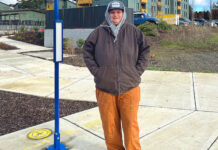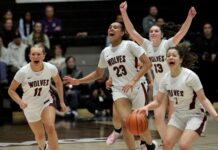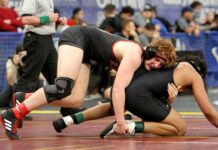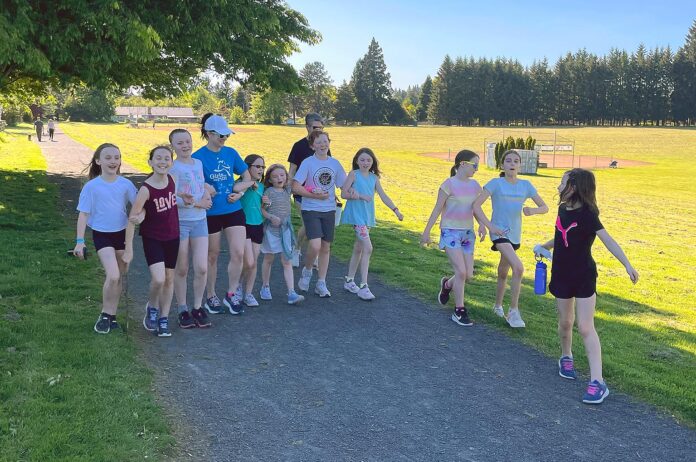
On a sunny May afternoon, the warmest of the year so far, a pack of girls chat and laugh their way through back-and-forth laps on the gravel path behind Byrom Elementary, occasionally ducking into the shade of one large tree along the route.
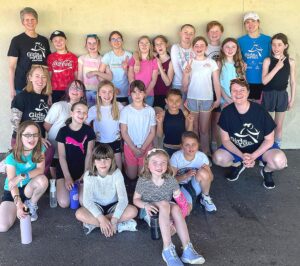
A casual observer could mistake the scene for simple exercise, a bit of after school fun, but these 3rd, 4th, and 5th graders are building more than physical fitness in their Girls on the Run club.
They’re gaining emotional intelligence as they make their way toward middle school.
“The lessons that these kids learn through this program are something I wish I would have learned at their age,” said coach Gena Conrad. “It’s self-confidence lessons, self-esteem, how to handle bullies, how to be an includer.”
The Byrom third-grade teacher has led the school’s popular program for eight seasons, but the longstanding club dates back more than a decade. Her team, which includes students from four area schools, is one of two in the district and 60 around the state and Southwest Washington that make up Girls on the Run Greater Oregon.
Despite the name Girls on the Run and the end-of-season 5k event the girls are training for on this hot day, most of the girls were walking to beat the heat.
And walking is just fine.
Run, walk, skip or jump, the club is about movement, and the motion is a vehicle carrying them to something bigger. The sessions build confidence and strengthen mental health through pointed lesson plans incorporating movement of all kinds.
“I love how empowering it feels for them,” said Madeline McCary, a volunteer coach who works in special education at Byrom. “In this day and age, there can be so much negative stuff that can be feeding into their brains, it’s nice to have something positive and uplifting. It’s even good reminders for myself sometimes.”
The girls and their crew of volunteer coaches meet twice a week after school for 10 weeks to work through the interactive lessons and games.
Each session begins with a warmup to get them moving and introduce the theme de jour, which, on this day at Byrom, was all about friendship and inclusivity, how to pull in kids who are being left out. They talked about strategies for reaching out to someone sitting alone at lunch and also considered that sometimes being alone is a choice.
“It’s very fun,” said 9-year-old Riley Carlson. “You get to exercise, you get to learn, and there are a bunch of fun activities.”
For every lap the girls completed on the field, they earned a shiny little star sticker to help fill in a map of constellations. The stickers were a call back to an early lesson on getting comfortable and proud of their own uniqueness, finding their star power and spreading light as a star sparkler.
Link the stars together in constellations, and they become inclusive clusters of friendship.
The club follows a curriculum from the decades-old national organization of the same name, designed to create a safe space for girls to practice tackling real-life scenarios, such as how to stand up for a friend who’s being bullied and how to compassionately encourage someone having a rough time.
“You learn a lot of lessons here like how to be kind and how to be inclusive and how to say hello (to someone new) and how to have positive self-talk,” said 10-year-old Peyton Cornette
For some kids, it’s a life changer.
Fawn McCool’s 5th-grade daughter Ayla joined last year at Mary Woodward and eagerly awaited spring to do it again. Ayla, who has autism and struggles to make social connections, found a love of running and new friendships.
“This is the best thing that happened to her last year. She met her best friend.” McCool said. “She’s neurodivergent, so connecting with other kids can be hard. She’s been able to connect to other girls through movement because sometimes it’s a lot of pressure to connect when you’re not moving.”
More than 2.5 million girls nationwide have participated since the club’s 1996 founding in North Carolina.
“I just love the goal of it, that it’s a non-competitive,” said runner and retired teacher Carrie Myerson, who volunteered to help coach after seeing a story about Girls on the run “(The girls) active and they’re helping each other out rather than trying to beat each other.”



